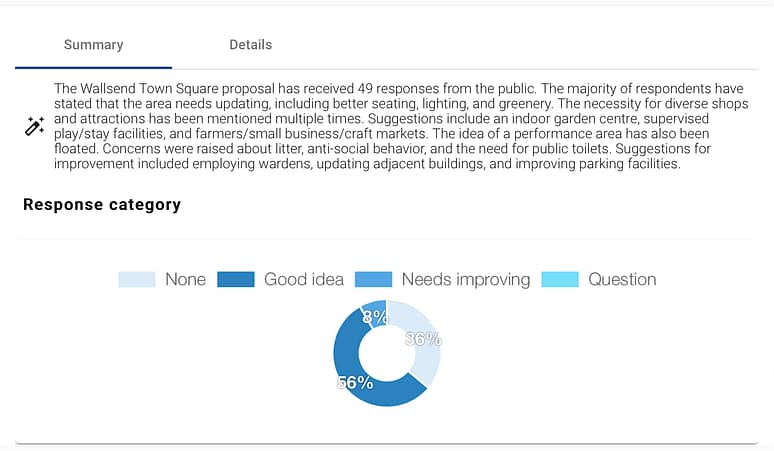Artificial intelligence in town planning can be hugely transformative. Here the PlaceChangers team looks at some of the key areas of focus in the coming years.
There is tremendous hype around artificial intelligence (AI). It has gone from Zero to Existential threat in less than 12 months. You may have seen the evil sentient AI in Mission Impossible or read that AI is a flashpoint in the recent strike of Hollywood actors. While entertainment is where we allow the blurring of fact and fiction, the impact of doing so in our lives and business is different.
In the UK, the Royal Town Planning Institute recently ran an event titled “AI is going to happen whether we like it or not”. Artificial intelligence-enabled processes are exploding and can make town planners' lives more enjoyable, efficient, and effective. We already use computers in our everyday lives. The next wave of intelligent processes has the potential to augment time-intensive town planning tasks that rely on human labour with additional intelligence and assistance.
At PlaceChangers, AI systems are not a replacement for human intelligence or social interaction. Computers and more intelligent automation can crunch data faster than humans and offer the potential for the ultimate decision support system. AI can perform inferential reasoning on a data set, regardless of size. It will have significant implications and, with any advance, will bring transformations, new job tasks, and training needs.
What is artificial intelligence in town planning anyway?
Machine-learning processes have advanced drastically. Artificial intelligence simulates human reasoning and processing to perform tasks. Machine learning is a branch of computer science that uses statistical methods to map quantitatively encoded information using large models trained on lots of data.
The training process - the process by which a machine “learns” and from which machine learning gets its name - is computationally very expensive. Still, once completed, the resulting model can perform complex tasks at relatively high speed and, importantly, on more information than a human can remember.
Alex Moon, CTO at PlaceChangers, added: Machine learning approaches have been around since the 1960s. However, we now see an explosion in their use as these models have become far more capable and accurate due to new approaches to training them and the availability of massive computers to train them in the first place. Many models rely on ‘transformers’ and are trained on text and unstructured information.
We’ve become used to voice assistants such as Alexa and Siri on consumer products. These voice assistants have limited capacity to process the information on the internet for specific questions, like “Siri, what will the temperature be in Newcastle today”.
Chatbots used to be limited to specific structured queries, but this has changed.
We are increasingly seeing new tools and computer assistants based on ‘Large Language Models’ (LLM), machine learning models that achieve more human-like responses regarding contextual matter, grammar, and facts. The best-known example of this is ChatGPT by OpenAI. These models substantially help businesses improve the customer experience with customers, understand large text faster, or enable new insights tools.
Similarly, more relevant for urban design and architecture, machine learning approaches have also been applied to more visual content, such as image and video generation, bringing about tools such as Dall-E or MidJourney. Those tools can generate new creatives simply based on text inputs.
How useful is artificial intelligence in town planning?
In the UK, and likely in other places, town planning has been drastically underfunded in recent years. Timelines for planning application approvals and production of town plans have been slipping across the board. In this context, a new wave of intelligent, easy-to-use automation can hugely empower town planners.
When integrated with town planning processes, generative AI can improve many interactions. Town planning is complex because it is very process driven, reliant on an ever-growing number of stakeholders and substantial amounts of data and evidence. The data can be spatial, text inputs, or policy documentation.
Seb Weise, Founder at PlaceChangers, added: "Machine learning in its most recent form can be truly transformative. While it is important to be cautious speculating on the impact of new innovations, AI requires a step change in how we think about work, train people accordingly, and rethink how all end-users can benefit from this change.
Here are some potential application areas we can think of:
- Create project inspirations: Applying better automation to create new content, including audio, code, images, text, simulations, and videos, generative AI can enable town planners to more readily produce tailored content, visual inspirations, or photomontages of potential changes. This can enhance interactions with stakeholders and create unique insights for projects. Gavin Wu at JDDK Architects has a helpful article on this: Emotional vs artificial intelligence in architecture
- Improved public consultation summaries: Consultation tools incorporating machine learning automation, such as the PlaceChangers consultation tool, can help analyse responses for sentiment and constructiveness and even generate quick content summaries of large amounts of responses. This helps town planners spot critical issues raised faster. Town planners can also rely on much faster ‘backend’ consultation administration by reducing time spent on analysis and summarisation.
- More responsive/personalised consultations: Town planners could generate chatbots and virtual assistants to help engage stakeholders, answering frequently asked questions and providing information about a town planning project, ensuring stakeholders access relevant information at their convenience, including diverse, disadvantaged, disengaged residents.
- Better risk analysis: Machine learning approaches can help town planners assess and mitigate risks associated with property development. Machine learning algorithms can analyse historical data to identify potential risks, such as environmental hazards, market volatility, or legal complications.
- Summary of planning policies: Machine learning approaches can help town planners summarise many policy texts into structured formats.
- Quicker planning documents: Town planners can rely on machine learning inputs to speed up routine reporting tasks involving compiling documentation for planning applications. This automation saves time and reduces the chances of errors, allowing property planners to focus on higher-level tasks that require human expertise.
Faster public consultation summaries
For instance, PlaceChangers consultation tool provides town planners automatic consultation summaries right out of the box.

Automatic consultation summaries with AI
Conclusion: AI in town planning
The planning application process is often slowed by the time to run informed community engagement consultations and quick geospatial analytics on communities, the capacity of local social infrastructure assets, and housing. Increased use of digital platforms, such as PlaceChangers, has helped town planners speed up this critical area. Adding AI tools to existing platforms provides levels of efficiency that most town planners could only dream of a couple of years ago.
Platforms like PlaceChangers help planners collect geospatial contextual data, understand resident needs, and then enhance and accelerate consultation responses in a customised way in real-time.
Artificial intelligence applied to enhance mundane town planning processes must balance automation and human interaction. While AI can improve project delivery and recurring tasks, town planners’ input will always remain. However, combining machine learning with human expertise can unlock better experiences for residents, councils, and developers across different touchpoints while ensuring faster planning applications.

PC Engagement - market leading planning engagement
Set up powerful map surveys and polls based on the changes that may come up on your estate and prioritise future planning interventions more easily.

PC Site Insights - Unique location insights tool for health and wellbeing outcomes
Start to make use of location data and enrich your community engagement planning with insights on local people. Add in your own data sources and gather analytics in one place.
